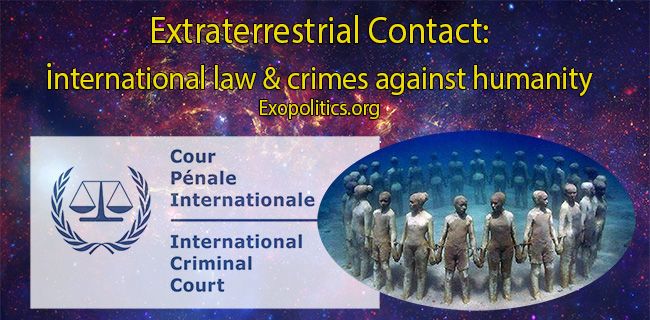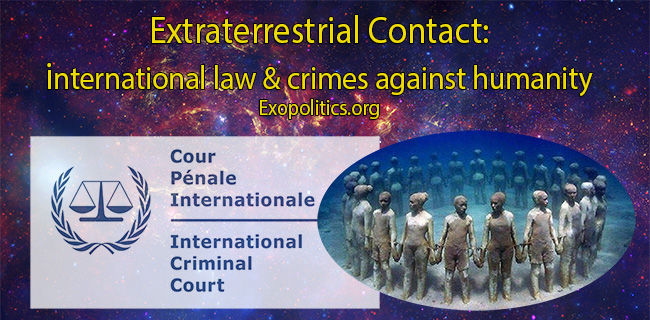
Extraterrestrial contact: international law & crimes against humanity
On June 15, a legal scholar released a provocative article in Space Review analyzing international legal norms and rights that would apply to visiting extraterrestrial life. The Space Review article comes less than a month after a bill (The Space Act) was passed by the U.S. House of Representatives dealing with U.S. and international law as it applies to commercial activities in space. “Legal implications of an encounter with extraterrestrial intelligence” is a very timely article due to international efforts to update commercial space laws, especially as it is becoming more likely than ever that eventually extraterrestrial life or artifacts will be encountered by national space programs – if they haven’t been already!
The Space Review article helps identify key issues about how to regard commercial activities in space that result from agreements with extraterrestrial life. In the case that some of these agreements violate international legal norms, then would this make such agreements valid or invalid? This is especially important since there have been testimonies by whistleblowers claiming that agreements have already been reached with alien visitors in secret space programs that allegedly involve crimes against humanity.
The author of “Legal implications of an encounter with extraterrestrial intelligence,” Babak Hassanabadi says that one of the first legal issues to resolve is whether extraterrestrials have the same “human rights” as the rest of us. He writes:
In a world first, a court in Argentina issued a historic and unprecedented ruling that favors the rights of an orangutan held in captivity. Sandra the orangutan was granted legal action so she may be transferred to a habitat in keeping with her development…. These developments with regard to assigning human-like rights for terrestrial nonhuman animals leaves no doubt for inferring that extraterrestrial intelligent life forms, at least in terrestrial legal systems’ point of view, will enjoy rights equal to their human counterparts.
Hassanabadi’s point is a fair one. If humanity is prepared to recognize an orangutan as having human rights, then we would do the same for extraterrestrials, even if they looked like Chewbacca, the Wookie from Star Wars.
Hassanabadi discusses what kind of laws would apply to alien visitors:
Although it seems very unlikely that technologically advanced aliens would recognize the political boundaries of our nation-states, if a spacecraft with aliens onboard landed anywhere on Earth, and they do not carry any political mission to make contact with humans, legally speaking they would be subject to the territorial jurisdiction in which they have entered unless otherwise collectively agreed upon by the international legal community.
If extraterrestrials land in New York City for example, then the laws of the Empire State and U.S. Federal laws would apply. In 1969, NASA passed a federal regulation dealing with ‘Extra-terrestrial Exposure’. The “Extraterrestrial Exposure Law” offers a legal precedent for the detention and indefinite imprisonment of any individual who comes into contact with extraterrestrials. Presumably extraterrestrials themselves could also be detained and quarantined under this little known NASA regulation that while officially withdrawn, created a legal precedent for its future use. May the Force be with any law enforcement officer trying to quarantine a Wookie.
Hassanbadi recommends another approach to local or national laws being applied to extraterrestrials:
The best approach would be to assign the aliens the same legal rights that foreign diplomats enjoy while they are on mission in foreign countries. That is, if extraterrestrials come to Earth in small or large numbers and reside temporarily or permanently, their laws and traditions among themselves should remain out of human legal intervention and judgment.
Basically, we would treat extraterrestrial visitors like the New York City authorities treat foreign diplomats. They have immunity from prosecution if they misbehave, but can be expelled for major crimes. Mayor Bill de Blasio stands an impressive 6’ 5” (196 cm) so an alien Wookie might do as he’s told if he was asked to leave.
Who would conduct negotiations with extraterrestrials? After examining a number of international protocols and treaties, Hassanabadi concludes the logical choice is the United Nations and its Secretary General:
To be certain, any negotiation with extraterrestrial intelligent life forms will be the most urgent global challenge of human history and no institution other than the United Nations (including its specialized organs) is more legitimate and accepted by consensus to take the lead in representing the human civilization…. we can conclude that from the point of view of international law that the UN Secretary General is the best candidate to sit at the negotiation table with extraterrestrial intelligent life forms if we meet them here on our planet.
Fortunately, the United Nations Headquarters is in New York City, so Bill de Blasio would be on hand if a Wookie tried to intimidate Ban Ki-moon who stands a mere 5’ 8” (175 cm).
Hassanabadi raises a critical observation about any agreements reached with alien visitors:
[I]f aliens travel to Earth to conclude any kind of pact, treaty, or agreement on behalf of their civilization with human civilization in general or—very unlikely but not impossible—with single nation-states on Earth, then existing international law shall prevail. In other words, the provisions of Vienna Convention about the law of treaties along with the principles of the charter of United Nations ought to be observed by human signatories of such interplanetary legal document. Here again, the diplomatic rights of the alien negotiating team should be upheld by their human political counterparts.
For most of the general public, such a point seems obvious and is no great cause for concern given the widespread view that we have yet to make contact with extraterrestrial life. Future agreements would presumably be done under the close scrutiny of a world public and media transfixed by the possibilities of humanity joining galactic society.
According to many whistleblowers, however, secret agreements have already been reached with extraterrestrial visitors. Surely such secret agreements would be null and void if they weren’t announced or ratified by national legislatures one might protest. Not so according to Hassanabadi’s legal analysis. Even agreements signed in secret between duly appointed national representatives without completion of the full ratification process – these are called ‘Executive Agreements’ – are valid under international law due to the “Vienna Convention about the law of treaties.”
A possibility that Hassanabadi didn’t examine is what happens if these secret agreements with aliens violate international law? What if there are future, or even past, agreements where humans are secretly taken away in an off-world slave trade? After all, during the 18th and 19th centuries, there were many agreements between colonial powers and local African elites that were accepted as valid under international commercial law at the time that made the slave trade possible. Could something analogous happen or be happening in space where secret commercial space laws make it possible for a form of galactic human slave trade to happen?
Dan Sherman worked for the US Air Force and the National Security Agency as an electronic communications expert for 12 years. He says he discovered agreements had been reached with aliens who were abducting people and taking them into space and reporting back to the NSA. Niara Terela Isley is a former US Air Force radar tracking operator who reveals that she was taken between eight and ten times to a moon base by a secret space program operating from the vicinity of Area 51 where she was briefly assigned. She claims the moon base was guarded by Reptilian beings that used human workers in slave labor conditions. Corey Goode claims to have served in a secret space program for 20 years. He says he witnessed and was briefed about humans being forced to work as slave labor in secret corporate bases on Mars, and even being sold off to aliens in other solar systems in a galactic slave trade.
Slavery is recognized as a “crime against humanity” and identified as such in a number of international treaties such as the Rome Statute that led to the creation of the International Criminal Court (ICC) in 2002. Here’s what the ICC has to say about slavery as a crime against humanity:
“Crimes against humanity” include any of the following acts committed as part of a widespread or systematic attack directed against any civilian population, with knowledge of the attack … enslavement; deportation or forcible transfer of population; … sexual slavery; enforced disappearance of persons… other inhumane acts of a similar character intentionally causing great suffering or serious bodily or mental injury.
If secret agreements have been reached with extraterrestrial visitors that involve slavery, then these agreements clearly violate international law, and are not protected under the “Vienna Convention about the law of treaties.” Consequently, signatories and those carrying out such agreements would be committing crimes against humanity, and be subject to prosecution under the International Criminal Court.
The idea of extraterrestrials reaching secret agreements with national representatives that violate international law and commit crimes against humanity may not be an abstract possibility to be debated by Hassanabadi and legal scholars. It is, according to Goode, Isley and others whistleblowers that served in or learned about classified space programs, a reality that has been happening behind the scenes for several decades now. Allegedly, there’s a flourishing slave trade and humanity will have to deal with the awful truth once the cover-up of extraterrestrial life is disclosed. If a Wookie has been involved in such an illegal human slave trade program, then all bets are off Mayor de Blasio – off to the International Criminal Court he goes!
© Michael E. Salla, Ph.D. Copyright Notice
[Update – 6/20/15 : I posted a comment to Babak Hassanabadi’s Space Review article notifying him about the above article and received the following reply: “Dear Dr.Salla,
Thank you very much for your comment and also I appreciate your very meticulous article “Extraterrestrial contact: international law & crimes against humanity” http://exopolitics.org/extraterrestrial-contact-i… . I totally agree with you that legal doctrines ought to be supplemented by evidential facts otherwise they will remain abstract and useless. But abstract theories might become very helpful if they shed light on how to deal with consequences of the situations all of which now may seem unlikely but if happen may cause tremendous chaos and uncertainty. As you truly pointed out in your thought article, in case any secret deal with aliens is made by governments that contradicts he generally accepted principles of international law, such agreement is doomed to be null and void . In such a case, International Criminal Court will have the jurisdiction to trial the persons in charge of making such a treaty or agreement due to committing crimes against humanity or other major offenses the court has jurisdiction over to adjudicate.
Once again thank you indeed.” Source]
Further Reading
- Secret US alien agreements may be valid under international law
- Galactic Human Slave Trade & AI threat to End with Full Disclosure of ET Life
- NSA document supports whistleblower claim of alien UFO communication program
- Corporate bases on Mars and Nazi infiltration of US Secret Space Program
- Astropolitics and the Exopolitics of Unacknowledged Space Activities
- Obama says space aliens control USA: Was he joking?
extraterrestrial contact, galactic slave trade, human rights, International Criminal Court, international law
